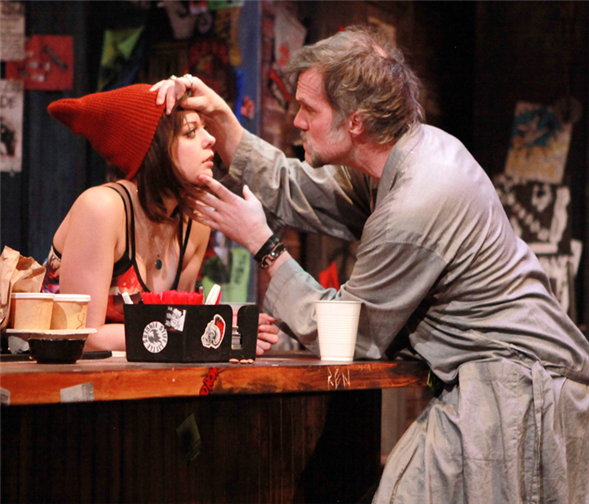Laura Eason's latest play channels the indie rock spirit
---
Of the two old-guard creative types grumbling their way toward obsolescence in Laura Eason's most recent plays -- the world-weary (female) writer in Sex With Strangers and the mulish (male) rock-club owner in The Undeniable Sound of Right Now -- the former would seem to be the more autobiographical.
But Undeniable Sound, now at Rattlestick Playwrights Theater, is set in the early 1990s, an era when grunge and other guitar-based rock styles began giving way to techno – and when Eason herself was stomping and singing her way around the Midwest as part of the band Tart.
"A few of my friends and I all realized at the same time that we didn't want to be just dating musicians," Eason says. "We wanted to be musicians."
Chicago was launching such acclaimed female-centered bands as Veruca Salt at the time, and Tart was part of that scene for about five years. But Eason, who was juggling her rock-star ambitions with a résumé that would include a lengthy stint as the artistic director of Chicago's Lookingglass Theatre, finally decided that her attention was being pulled into too many different directions.
"I was never quite as committed to being a musician as they were," she says. "I was never all in."
This all-or-nothing mentality manifests in Undeniable Sound in the form of Hank, the proprietor of an unnamed Chicago rock club and a man clinging to his retro sensibilities with every ounce of his dwindling strength. Unlike Olivia, who grumbles about new literary business models while succumbing to their various temptations in Sex With Strangers, Hank has drawn a firm and seemingly unbreachable line between the latest trends and, as he sees it, the styles that are built to last.
But as the play's title makes clear, the new isn't about to be denied, by Hank or by anyone else.
{Image1}
Hank may represent an extreme case, but Eason says this mentality was prevalent in the 1990s. "There was a real underground then," she says. "There were a lot more arguments about being truly indie and never selling out. Remember, this is pre-internet and pre- this notion that everyone can be a superstar."
In the script, the only music actually performed on stage comes from Nash, a rising DJ who instantly gets on Hank's bad side and stays there, in part by dating his daughter. But Eason and her director, Kirsten Kelly, bolstered the old guard's argument when they cast the musical theatre veteran Jeb Brown as Hank. "Jeb is a wonderful guitarist, so we have a few chances now to get some real music in it," Eason says, and that "real" may suggest her point of view as much as anything in the script.
Eason -- who just finished writing Season 3 of the TV series House of Cards, along with fellow playwrights Melissa James Gibson, Frank Pugliese, and Kenneth Lin -- has heard the complaint that television has contributed to a brain drain among playwrights. Does TV pose the same threat to traditional performance as salacious bloggers and record-spinning DJs?
"Look, there's always this dynamic of 'the new thing' and what it means to people who are inhabiting the old space," she says."But as human beings, we all crave that feeling of all being in the same room together." Hank and Nash both honor that communal impulse in Undeniable Sound, albeit in very different ways. As the play suggests, then, no matter what's coming next, it can be hard to deny the sound of millennia of live performance.
---
Eric Grode is a freelance arts writer and a professor at Syracuse University’s Goldring Arts Journalism Program
Photos by Sandra Coudert. Top photo: Margo Seibert and Jeb Brown.
